VIVEKACHUDAMANI
OF
SRI SANKARACHARYA
Text, with English Translation, Notes and Index
BY
SWAMI MADHAVANANDA
1932
Rs. 2/-
CONTENTS
FOREWORD
Scarcely any introduction is needed for a book that professes to be, as its titleCrest-jewel of Discriminationshows, a masterpiece on Advaita Vednta, the cardinal tenet of which is:  Brahman alone is real, the universe is unreal and the individual soul is no other than the Universal Soul. Being an original production of Sankaras genius, the book combines with a searching analysis of our experience an authoritativeness and a depth of sincerity that at once carry conviction into the heart of its readers. The whole book is instinct with the prophetic vision of a Seer, a man of Realisation, and the expression, too, is so lucid and poetical that quite a new life has been breathed into the dry bones of philosophical discussion, and that, too, on the most abstruse subject ever known.
Brahman alone is real, the universe is unreal and the individual soul is no other than the Universal Soul. Being an original production of Sankaras genius, the book combines with a searching analysis of our experience an authoritativeness and a depth of sincerity that at once carry conviction into the heart of its readers. The whole book is instinct with the prophetic vision of a Seer, a man of Realisation, and the expression, too, is so lucid and poetical that quite a new life has been breathed into the dry bones of philosophical discussion, and that, too, on the most abstruse subject ever known.
In preparing this edition, which is a reprint in book-form from the Prabuddha Bharata, the translator gratefully acknowledges his indebtedness to the admirable Sanskrit commentary of Swami Kesavacharya of the Munimandal, Kankhal, which along with the Hindi translation would be highly useful to those who want a fuller knowledge of this book.
For facility of reference an Index has been added, and the book, it is hoped, will in its present form be a vade-mecum to all students of Advaita Philosophy.
PREFACE TO THE SECOND EDITION
In this edition the book has been generally revised and some improvement has been made as regards printing and other matters. All this, it is hoped, will make the book more acceptable to the public.
Mayavati, 1926.
VIVEKACHUDAMANI

1. I bow to Govinda, whose nature is Bliss Supreme, who is the Sadguru, who can be known only from the import of all Vedanta, and who is beyond the reach of speech and mind.
In this opening stanza salutation is made to God (Govinda), or to the Guru, in his absolute aspect. It may be interesting to note that the name of Sankaras Guru was Govindapda, and the Sloka is ingeniously composed so as to admit of both interpretations.
[Viveka means discrimination, Chud is crest, and Mani, jewel. Hence the title means Crest-jewel of discrimination. Just as the jewel on the crest of a diadem is the most conspicuous ornament on a persons body, so the present treatise is a masterpiece among works treating of discrimination between the Real and the unreal.
Sadgurulit. the highly qualified preceptor, and may refer either to Sankaras own Guru or to God Himself, who is the Guru of Gurus.]

2. For all beings a human birth is difficult to obtain, more so is a male body, rarer than that is Brahminhood, rarer still is the attachment to the path of Vedic religion; higher than this is erudition in the scriptures; discrimination between the Self and not-Self, Realisation, and continuing in a state of identity with Brahman,these come next in order. (This kind of) Mukti is not to be attained except through the well-earned merits of a hundred crore of births.

3. There are three things which are rare indeed and are due to the grace of Godnamely, a human birth, the longing for Liberation, and the protecting care of a perfected sage.
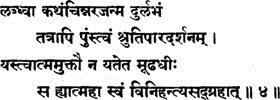
4. The man who having by some means obtained a human birth, with a male body and mastery of the Vedas to boot, is foolish enough not to exert for self-liberation, verily commits suicide, for he kills himself by clinging to things unreal.

5. What greater fool is there than the man who having obtained a rare human body, and a masculine body too, neglects to achieve the real end of this life?
[The real end &c.viz., Liberation.]
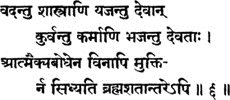
6. Let people quote scriptures and sacrifice to the gods, let them perform rituals and worship the deities, there is no Liberation for anyone without the realisation of ones identity with the Atman, no, not even in the lifetime of a hundred Brahms put together.
[Lifetime &c.i.e., an indefinite length of time. One day of Brahm (the Creator) is equivalent to 432 million years of human computation, which is supposed to be the duration of the world.]

7. There is no hope of Immortality by means of richessuch indeed is the declaration of the Vedas. Hence it is clear that works cannot be the cause of Liberation.
[The reference is to Yjnavalkyas words to his wife Maitreyi, Brihadranyaka II. iv. 2. Cf. the Vedic dictum,  Neither by rituals, nor by progeny, nor by riches, but by renunciation alone some attained Immortality.]
Neither by rituals, nor by progeny, nor by riches, but by renunciation alone some attained Immortality.]
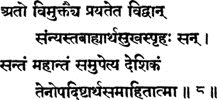
8. Therefore the man of learning should strive his best for Liberation, having renounced his desire for pleasures from external objects, duly approaching a good and generous preceptor, and fixing his mind on the truth inculcated by him.
[Dulyi.e., according to the prescribed mode. (Vide Mundaka I. ii. 12.) The characteristics of a qualified Guru are given later on in sloka 33.]

one should recover oneself, immersed in the sea of birth and death, by means of devotion to right discrimination.
[Yogrudha stateDescribed in Gita VI. 4.When one is attached neither to sense-objects nor to actions, and has given up all desires, then he is said to be Yogrudha or to have ascended the Yoga-path.]

10. Let the wise and erudite man, having commenced the practice of the realisation of the Atman, give up all works and try to cut loose the bonds of birth and death.
[All worksonly Sakma-karma or works performed with a view to gaining more sense-enjoyment are meant, not selfless work.]

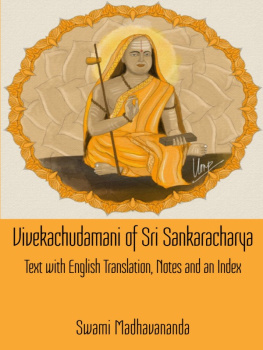


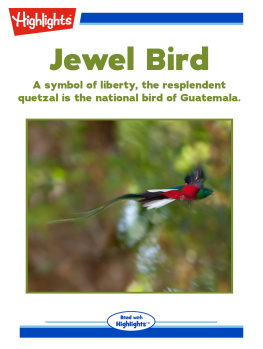
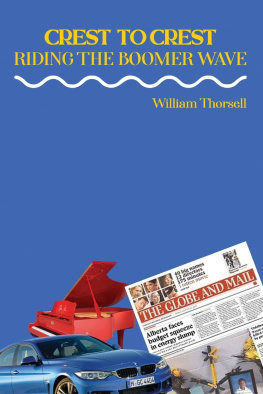

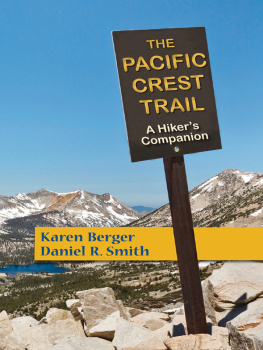
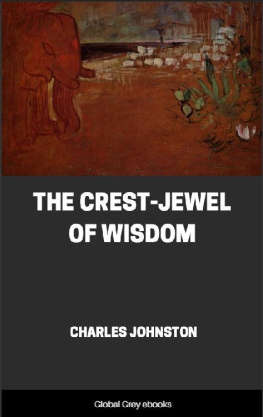



 Brahman alone is real, the universe is unreal and the individual soul is no other than the Universal Soul. Being an original production of Sankaras genius, the book combines with a searching analysis of our experience an authoritativeness and a depth of sincerity that at once carry conviction into the heart of its readers. The whole book is instinct with the prophetic vision of a Seer, a man of Realisation, and the expression, too, is so lucid and poetical that quite a new life has been breathed into the dry bones of philosophical discussion, and that, too, on the most abstruse subject ever known.
Brahman alone is real, the universe is unreal and the individual soul is no other than the Universal Soul. Being an original production of Sankaras genius, the book combines with a searching analysis of our experience an authoritativeness and a depth of sincerity that at once carry conviction into the heart of its readers. The whole book is instinct with the prophetic vision of a Seer, a man of Realisation, and the expression, too, is so lucid and poetical that quite a new life has been breathed into the dry bones of philosophical discussion, and that, too, on the most abstruse subject ever known.






 Neither by rituals, nor by progeny, nor by riches, but by renunciation alone some attained Immortality.]
Neither by rituals, nor by progeny, nor by riches, but by renunciation alone some attained Immortality.]

